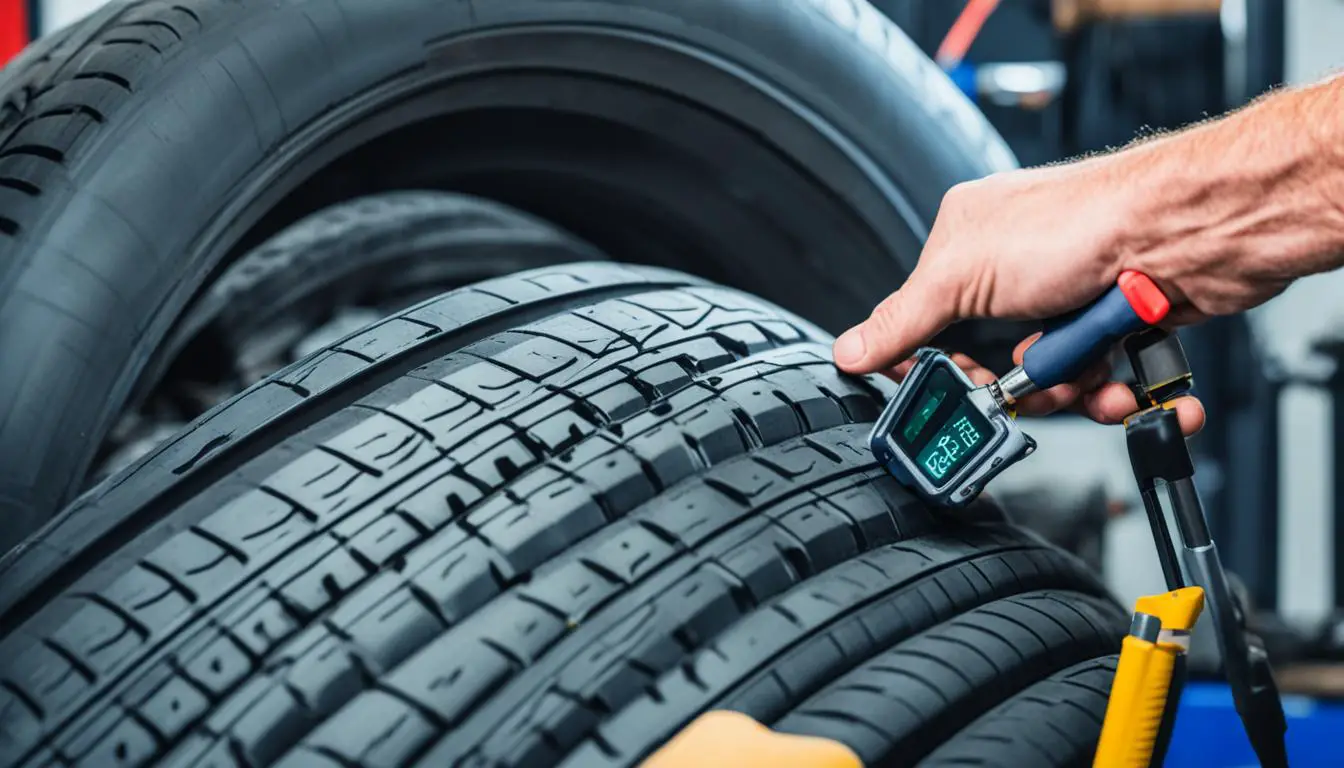
Expert Tire Maintenance Tips for Optimal Performance
Tire maintenance is crucial for the smooth operation and longevity of your vehicle. By following expert tips, you can ensure that your tires perform optimally, providing you with a safe and efficient driving experience. These tire maintenance tips have been gathered from reliable sources and are based on factual data.
Key Takeaways
- Regular tire maintenance is essential for optimal vehicle performance.
- Proper tire rotation helps prolong tire life and maintain even wear.
- Wheel alignment plays a crucial role in tire wear and fuel efficiency.
- Checking tire pressure regularly ensures safe driving and extends tire lifespan.
- Inspecting tread depth helps determine tire condition and grip on the road.
Importance of Regular Tire Rotation
Regular tire rotation is a crucial aspect of tire maintenance that often gets overlooked. It involves moving each tire to a different position on the vehicle to ensure even wear. By regularly rotating your tires, you can effectively prolong their life and improve overall performance.
Tire wear is inevitable, but it can be significantly reduced and managed through regular rotation. The front tires tend to wear faster than the rear tires due to steering and braking forces. By rotating the tires, you distribute the wear more evenly, helping them last longer.
Uneven tire wear can lead to various problems, including reduced traction, compromised handling, and increased risk of blowouts. By maintaining regular tire rotation, you minimize these risks and ensure a safer driving experience for yourself and your passengers.
In addition to prolonging tire life and improving safety, regular tire rotation also offers other benefits. It helps maintain optimal fuel efficiency by ensuring all tires have equal traction and rolling resistance. This can lead to cost savings in the long run, as fuel consumption is reduced.
To further emphasize the significance of regular tire rotation, here is a table showcasing the recommended frequency of rotation for different types of vehicles:
| Vehicle Type | Recommended Rotation Frequency |
|---|---|
| Front-Wheel Drive | Every 5,000 to 8,000 miles |
| Rear-Wheel Drive | Every 5,000 to 8,000 miles |
| All-Wheel Drive | Every 3,000 to 5,000 miles |
By following this recommended rotation frequency, you can ensure that your tires wear evenly and maximize their lifespan. It’s worth noting that specific vehicle manufacturers may have their own recommendations, so it’s always a good idea to consult your owner’s manual for the most accurate guidelines.
The Benefits of Proper Wheel Alignment
Proper wheel alignment is a critical aspect of tire maintenance that should not be overlooked. When your wheels are properly aligned, it results in a smoother and safer driving experience. But that’s not all – the benefits of proper wheel alignment go beyond just comfort.
One of the key advantages of ensuring proper wheel alignment is reducing tire wear. When your wheels are misaligned, it puts unnecessary stress on certain areas of the tires, causing them to wear unevenly. This not only shortens their lifespan but also affects their performance. By having your wheels aligned, you can ensure that your tires wear evenly, which can save you money in the long run by avoiding premature tire replacements.
In addition to prolonging tire life, proper wheel alignment also contributes to improved fuel efficiency. When your wheels are misaligned, it creates additional drag, making your engine work harder to propel the vehicle forward. This increased resistance leads to higher fuel consumption. However, with proper wheel alignment, you can minimize this resistance, optimizing your vehicle’s fuel efficiency and saving you money at the pump.
Furthermore, proper wheel alignment enhances overall vehicle performance. Misaligned wheels can impact handling and steering responsiveness, making your vehicle more difficult to control. By maintaining proper wheel alignment, you can enjoy smoother steering, improved handling, and enhanced safety on the road.
FAQ
Why is regular tire rotation important for tire maintenance?
Regular tire rotation is important for tire maintenance because it helps ensure even wear on all tires. This prolongs the life of the tires and promotes optimal performance of the vehicle.
How often should I rotate my tires?
It is generally recommended to rotate your tires every 5,000 to 7,500 miles. However, it is best to consult your vehicle’s owner manual or a tire professional for the specific recommendations for your vehicle.
How does proper wheel alignment benefit tire maintenance?
Proper wheel alignment is essential for tire maintenance as it helps prevent uneven tire wear. It also improves fuel efficiency and overall vehicle performance.
When should I have a wheel alignment done?
It is recommended to have a wheel alignment done if you notice any signs of uneven tire wear, such as the vehicle pulling to the side or vibrations while driving. Additionally, it is a good idea to have a wheel alignment done when you install new tires.
Can I do the tire rotation or wheel alignment myself?
While it is possible to do tire rotation and wheel alignment yourself, it is often best to leave it to the professionals. They have the expertise and proper equipment to ensure the job is done correctly and safely.
